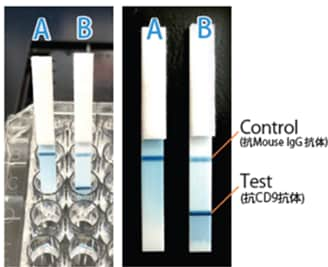July 4, 2023 | News & Notices
Collaboration in Developing the World’s First Immunochromatography Kit for Extracellular Vesicles
Dai Nippon Toryo to Start Domestic Sales
Shimadzu Corporation has collaborated in developing Exorapid-qIC, an immunochromatography kit for extracellular vesicles (CD9) to be launched for advanced domestic sales on July 25 by Dai Nippon Toryo Co., Ltd. Exorapid-qIC is the world’s first immunochromatography reagent kit that targets exosomes, which are a type of extracellular vesicle (EV). Exorapid-qIC comes with “gold nanoplate-labeled antibodies,” which are antibodies bound to gold nanoplates made by Dai Nippon Toryo, “immunochromatography test paper” that traps exosomes when wetted with a sample solution, and a “rinse solution” used to rinse the test paper. Shimadzu Corporation is mainly responsible for choosing which type of EVs are detected by Exorapid-qIC and for optimization and assessment of the exosome detection system. Using immunochromatographic reagents for analysis reduces initial costs associated with test equipment and reduces testing times to 45 minutes, just one-fifth the time required for previous methods.
EVs are a cytoplasmic membrane released by cells and classified by their size and mechanism of production. Exosomes are a type of EV around 100 nm in diameter found in abundance in blood, urine, and other bodily fluids. Exosomes carry a range of information from their parental cell and are being studied for their potential utility in diagnostic applications. For example, exosomes released by cancer cells (malignant tumors) could be used for early cancer diagnosis. Diagnosing cancer based on exosomes would be less invasive than a conventional tissue biopsy and cheaper than MRI or other diagnostic imaging methods. Exosomes have also been attracting interest for their therapeutic potential. Reports have shown that exosomes released by mesenchymal stem cells (MSCs), which are used in regenerative medicine, have the ability to cure diseases and heal wounds, and clinical studies of exosomes are already underway outside of Japan.*
However, the analytical methods being used to study exosomes come with issues such as complex processes and the need for expensive analytical instruments. For example, exosome-related experiments performed using ELISA take several hours to complete, and nanoparticle tracking analysis (NTA) requires very expensive equipment. Dai Nippon Toryo and Shimadzu recognized immunochromatography (IC) as a rapid and simple technique that could be used in exosome research. Immunochromatographic assays are capillary action-based immunoassays and are commonly used to detect pregnancy and influenza viruses.
Exorapid-qIC detects exosomes by exposing test paper to a sample solution and a solution containing “gold nanoplate-labeled antibodies,” which are antibodies bound to gold nanoplates made by Dai Nippon Toryo. If the sample solution contains exosomes, two lines appear on the test paper; a test line and a control line (as shown on test paper B below). The test time from beginning to end is around 45 minutes, allowing for rapid testing.

A: Blank; B: Sample
Using the Exorapid-qIC Immunochromatography Kit for Extracellular Vesicles
(Left: During testing; Right: Test complete)
Since 2017, Dai Nippon Toryo and Shimadzu have collaborated on life science applications for precious metal nanoparticles originally developed by Dai Nippon Toryo for infrared absorption, diagnostic drug, and testing applications; the Exorapid-qIC is one result of this collaboration. Dai Nippon Toryo and Shimadzu intend to continue developing new immunochromatography reagent kits and technologies capable of detecting various type of EVs.
- Reference: Takahiro Ochiya and Yusuke Yoshioka “Exosomes encourage the medical innovation—From biological function to disease mechanisms and clinical applications” (Kagakudojin, 1st Edition, 1st Printing, Published on August 25, 2018)
Contact : evs-support@star.dnt.co.jp


